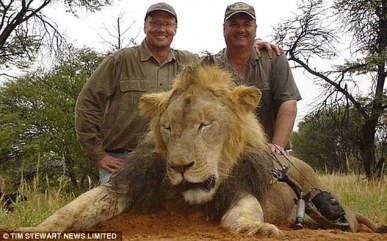
Walter Palmer (left), who killed Cecil the lion.
http://rtfitchauthor.com/2016/03/11/where-do-the-presidential-candidates-stand-on-humane-issues/
Source: wisconsingazette.com
Want to know where the presidential candidates stand on humane issues? A look at the top contenders in both political parties:
Hillary Clinton: In the U.S. Senate, she earned a 100 percent score on the Humane Scorecard in the 108th and 109th Congresses and an 83 in the 110th. She cosponsored legislation dealing with horse slaughter and animal fighting, as well as bills to stop the processing of “downer” livestock and to crack down on abusive puppy mills. She also led efforts to stop the overuse of antibiotics in farm animals. Additionally, Clinton signed letters requesting more funds for the U.S. Department of Agriculture to enforce the Animal Welfare Act, the Humane Methods of Slaughter Act and the federal animal fighting law.
During the 2008 campaign, she voiced concern over the slaughter of sick and injured cows whose meat was channeled into the national school lunch program.
As secretary of state, she led international efforts to crack down on wildlife trafficking and, through the Clinton Foundation, she helped to launch a major campaign to fight the illegal ivory trade and poaching of elephants.
Bernie Sanders: Sanders has been a steady and consistent supporter of animal protection in Congress. As a House member, he earned a 58 percent on the Humane Scorecard for the 103rd Congress, 75 percent in the 104th, 60 percent in the 108th and a 100 percent score in the 106th and 109th. As a senator, he scored 100 percent in the 110th, 112th, and 113th Congresses, an 89 in the 111th and an 86 percent in the most recent session.
In the current session, Sanders is cosponsoring legislation to protect pets in domestic violence, ban horse slaughter for human consumption, create a felony penalty for malicious animal cruelty and a crack down on horse soring abuses. He opposed the weakening of the Endangered Species Act.
In previous sessions, he cosponsored bills to crack down on puppy mills and animal fighting, to restrict the private trade in big cats and primates as exotic pets and to ban barren battery cages for egg-laying hens. He also helped to lead an effort to end the use of chimpanzees in invasive research.
Sanders was the first presidential candidate to publish an animal welfare statement and it’s a strong and compelling one that demonstrates his concern for the issues, as well as his leadership.
In the GOP
Donald Trump: When Trump owned the Steel Pier in Atlantic City, he reportedly was involved in canceling an inhumane horse-diving act. On the down side, he has defended his sons’ trophy hunting of African wildlife, including giraffes, buffaloes and lions. Trump also lamented Ringling Bros.’ decision to phase out its performing elephants.
Ben Carson: Carson has said little about animal welfare issues throughout his career, but he says in interviews that he is mostly vegetarian, and, in a 1990 interview with Vegetarian Times he shared his belief that “eventually there will no longer be a reason for most people to eat meat. And animals will breathe a sigh of relief.”
Ted Cruz: Cruz received a score of 12 percent in the 113th Congress and received a zero for the first session of the 114th Congress. He is not cosponsoring any current animal protection legislation.
Marco Rubio: Rubio was among a handful of senators who opposed a floor amendment to ban bringing children to animal fights. He scored 28 percent on the Humane Scorecard for the 112th Congress. He received a score of 12 percent for the 113th and he scored a zero in the first session of the 114th. On the positive side, Rubio cosponsored legislation to strengthen enforcement against horse soring in the previous Congress and, in the Florida Legislature, he sponsored a bill to strengthen an animal fighting statute.
John Kasich: As governor of Ohio, Kasich acted swiftly in response to the release of dozens of bears, lions, tigers, wolves and other exotic animals in Zanesville, setting a moratorium on the sale of exotic animals. He has signed bills upgrading laws on animal cruelty and puppy mills and allowing pets to be included in domestic violence protective orders. He entered the governor’s office following an agreement between The HSUS and the state, and he’s done a creditable job of handling the provisions — including the phase-out of veal crates for calves, gestation crates for breeding pigs, tail-docking of dairy cattle and protections for “downer” cows.

